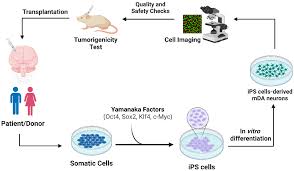Stem Cell Therapy for Parkinson’s Disease:

Researchers at Kyoto University conducted a Phase I/II clinical trial to assess the safety and side effects of stem cell therapy using dopaminergic progenitors derived from human induced pluripotent stem cells (iPSCs).
- Parkinson’s disease is a neurodegenerative disorder that causes the progressive loss of dopamine-producing neurons in the brain.
- Dopamine is a critical neurotransmitter responsible for regulating motor functions.
- The conventional treatment mainly involves dopaminergic medications, but these do not restore lost neurons and may have long-term side effects.
- Pluripotent Stem Cells (iPSCs) are pluripotent stem cells generated from adult somatic cells (like skin or blood).
- They are reprogrammed to an embryonic-like state, allowing them to develop into any human cell type.
- Used in:
- Diabetes (converted into beta cells),
- Leukaemia (to generate new blood cells),
- Neurological diseases.
- iPSCs are valuable in drug testing, disease modeling, and transplantation medicine.
- Stem Cells : Stem cells are undifferentiated primitive cells capable of developing into specialised cells like blood, muscle, or liver cells. Their ability to self-renew and differentiate makes them vital for regeneration and repair.




